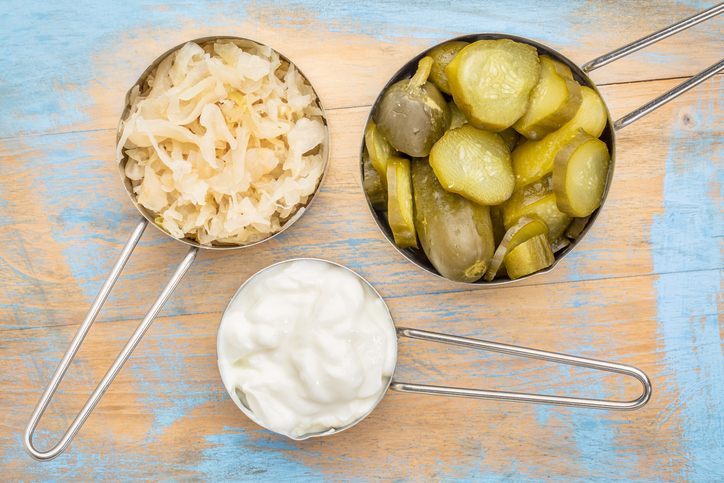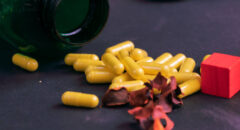 When you think of bacteria, many people think of germs and the thought of actually eating it on purpose may sound a little disgusting–especially when you think of what some bacteria can do to your insides including make you sick, hospitalized or even worse.
When you think of bacteria, many people think of germs and the thought of actually eating it on purpose may sound a little disgusting–especially when you think of what some bacteria can do to your insides including make you sick, hospitalized or even worse.
But if you understand what germs and bacteria are, you may be better off.
Germs is a general term for microorganisms that can cause disease.
Bacteria is a specific type of germ that are single-celled prokaryotes (organisms lacking a nucleus).
Did you know that not all bacteria are bad? According to scientists, we should be eating more bacteria–the good type, that is.
Benefits of Good Bacteria
Science shows diets containing certain kinds of “good” live bacteria known as probiotics, found in fermented foods or supplements have a number of great benefits.
Good bacteria are vital to helping keep your body healthy and to keep the bad bacteria in check. Probiotics are supplements that contain large amounts of healthy bacteria to improve your gut health and keep the harmful bacteria to a minimum.
There are a lot of benefits to good bacteria, including improving the health of your gastrointestinal tract. However, the benefits span more than just this part of your body, and they include:
- Strengthening your immune system
- Improving your mental health
- Elevating your energy
- Lowering your cholesterol
- Boosting weight loss
- Keeping your hormones regulated
Good bacteria can also improve the health in your mouth and gums as well as to help you live longer. Basically, good bacteria is vital to the healthy function of most of the cells and systems within your body. Without it, bad bacteria would take over, resulting in sickness and disease.
Common Strains of Bacteria You’ll See on Labels
Before we get into it, here are six common strains of probiotics that you’ll find on food and supplement labels.
B. animalis: This strain is an ingredient in Dannon yogurt’s Activia product. It’s helpful in aiding digestion and fighting food-borne bacteria. It’s also thought to boost your immune system.
B. breve: This strain lives in your digestive tract and in the vagina. In both places, it fights off infection-causing bacteria or yeast. It helps your body absorb nutrients by fermenting sugars. It also breaks down plant fiber to make it digestible.
B. lactis: This is derived from raw milk. It’s an ingredient in Nestle’s probiotic infant formula, called Good Start Natural Cultures. It also serves as a starter for:
- buttermilk
- cottage cheese
- other cheeses
B. longum: This strain lives in your gastrointestinal tract. It helps break down carbohydrates and also can be an antioxidant.
L. acidophilus: This strain is found in the small intestine and in the vagina. It helps digestion and may help fight off vaginal bacteria. You can find it in yogurt and fermented soy products, such as miso.
L. reuteri: This strain is found in the intestine and mouth. One study showed that it decreased the oral bacteria that cause tooth decay. It’s also thought to help the digestive system.
Types of Bacteria that are good for you
According to the Mayo Clinic, here are 9 strains of beneficial bacteria and their major reported health benefits which can be found in some fermented foods, such as yogurt, kefir, soy products, and pickles.
1. Lactobacillus Acidophilus
Reduces abdominal pain and bloating symptoms. This bacteria also supports a healthy immune digestive system.
2. Lactobacillus Plantarum
Reduces the risk factors of cardiovascular disease, especially in smokers.
3. Lactobacillus Casei
Alleviates symptoms of occasional diarrhea and encourages the growth of beneficial bacteria.
4. Lactobacillus Rhamnosus
Calms skin irritation.
5. Lactobacillus Salivarius
Protects the intestinal barrier against damage during the digestive process and reduces bad breath.
6. Lactobacillus Brevis
Improves inflamed gum conditions.
7. Bifidobacterium Longum
Improves symptoms associated with gluten intolerances.
8. Bifidobacterium Bifidum
Alleviates inflammation in the large intestine.
9. Streptococcus Thermophilus
Reduces cardiovascular disease risk factors together with Lactobacillus Rhamnosus and Lactobacillus Acidophilus.
Get Probiotics Like A Pro
So, what are the sources to add these probiotics to your diet? Yogurt is one of the most popular natural food sources to get them, but there are many others like sauerkraut, kimchi, miso, tempeh, kefir, pickles, natto, buttermilk, and gouda cheese.
10 Fermented Foods that Contain Good Bacteria
Kefir. The tart yogurt-like drink is often made with dairy milk, but also comes in nondairy alternatives, like coconut water, coconut milk, and rice milk. Kefir also comes in fruit and vegetable flavors.
Kimchi. Kimchi is a spicy, reddish fermented cabbage dish. You can find jars of it at most grocery stores or Asian markets.
Kombucha. This tangy fermented tea drink is found in many grocery and specialty food stores. Some brands have added sugar, so make sure the label lists no more than 5 grams per serving.
Miso. The paste is a staple in Japanese cuisine, especially in soup. It’s made from soybeans fermented with brown rice and has a strong, salty flavor.
Pickles. Choose brands brined in water and sea salt instead of vinegar. Vinegar stops good bacteria from growing.
Sauerkraut. Select raw or nonpasteurized sauerkraut, which contains more bacteria strains. You can find them in specialty grocery stores.
Sourdough bread. This kind of bread is baked with fermented flour. Not all store-bought bread labeled “sourdough” uses it, so shop at an artisan bakery or specialty grocery store.
Tempeh. Tempeh is a cake made from fermented soybeans with a firmer texture than tofu. It often comes precooked and ready to eat.
Yogurt. Some brands include a Live & Active Cultures (LAC) seal from the International Dairy Foods Association. This certifies that the product has been fermented. But not all yogurts have this, so look for the words “live and active cultures” on the label. Also, opt for plain, unflavored brands when possible, as they contain less sugar per serving than most flavored and fruit-based yogurts.









